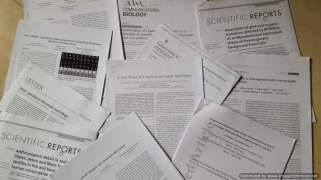 Many of us who read research literature may notice that research is a very “trendy” business. For example, the areas of “personalized learning” and “individualized instruction” became very popular for about 10 years between the late 1990s and the early 2010s. Subsequently this subject has faded away and few papers address the topic. Why?
Many of us who read research literature may notice that research is a very “trendy” business. For example, the areas of “personalized learning” and “individualized instruction” became very popular for about 10 years between the late 1990s and the early 2010s. Subsequently this subject has faded away and few papers address the topic. Why?
Generalizing from my personal experience, I doubt that the shift in trend results from loss of interest on the part of the researchers. If one invests 10 years of study on a topic, boredom is unlikely to cause the shift. Perhaps we should explore three other possible influences.
First to come to mind is results. Many research projects focus on very tough nuts to crack. Figuring how to provide a custom curriculum for every student at scale isn’t easy. After chipping away at such a problem for 10 years it may continue to be of interest but an investigator may be daunted by how far in the distance a solution still appears. When significant results are scarce a line of research may be difficult to continue to pursue.
A second force may be the acceleration of technical change. In a field like education, one is concerned not only with the content being taught, the tools used to deliver that content become a subject of study in their own right. As computing devices infiltrated teaching practice, I’ve seen educational researchers struggle to separate the impact of motivation to play with the machine from both learner and investigator focus on the instructional content. Instead of varying one experimental factor at a time, researchers changed the phenomenon being investigated, the experimental methods employed and the situational context from one experiment to the next. No wonder results about the impact of computing in education have been inconclusive and/or unrepeatable.
A third force is inconsistency in funding for research. Funders, like the rest of us, tend to be dazzled by the latest and greatest innovations that are grabbing the headlines. A foundation may invest millions in a line of research such as personalized learning over a period of years and then suddenly switch to a sexier topic. When I follow the individual researchers who were publishing on personalized learning ten years ago, they show up today in searches for data analytics, MOOCs, AI in education, or workforce retraining. Personalization is no longer an effective keyword. Personalization may be an underlying factor in any or all of these new titles but the connection is difficult to track.
What makes interest histories important? By failing to sustain a line of research from conception of a problem to solution, we waste huge amounts of money and slow the impact of research way down. We discourage careers and often fail to recognize brilliant, although preliminary advances. We make it harder for those with an underlying passion for the same interest to find each other and collaborate.
 Today we have some wonderful data visualization tools to make interest histories easier to track and thereby encourage valuable collaborations. We can display mesh diagrams showing student-professor relationships as well as co-authorship of papers and patterns of citations. We can see which journals are featuring articles we need to read, what conferences we would benefit from attending and how siloed groups of practitioners can cross-fertilize each other. The migration of keywords that indicate an underlying interest can come to light. Perhaps an even more practical use of such analytical methods would be to alert us when promising research initiatives begin to starve from loss of funding. I doubt that lack of interest is a key force here. It’s time we paid attention to what is driving trends in research.
Today we have some wonderful data visualization tools to make interest histories easier to track and thereby encourage valuable collaborations. We can display mesh diagrams showing student-professor relationships as well as co-authorship of papers and patterns of citations. We can see which journals are featuring articles we need to read, what conferences we would benefit from attending and how siloed groups of practitioners can cross-fertilize each other. The migration of keywords that indicate an underlying interest can come to light. Perhaps an even more practical use of such analytical methods would be to alert us when promising research initiatives begin to starve from loss of funding. I doubt that lack of interest is a key force here. It’s time we paid attention to what is driving trends in research.

